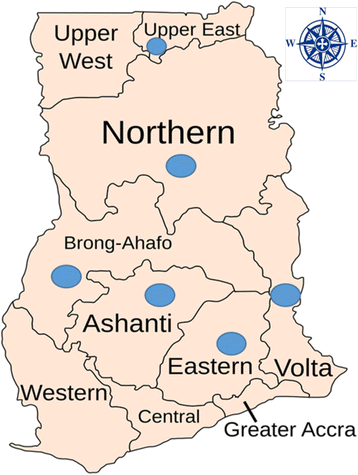Food safety knowledge, attitudes and practices of institutional food-handlers in Ghana
- PMID: 28061850
- PMCID: PMC5219779
- DOI: 10.1186/s12889-016-3986-9
Food safety knowledge, attitudes and practices of institutional food-handlers in Ghana
Abstract
Background: In large scale cooking, food is handled by many individuals, thereby increasing the chances of food contamination due to improper handling. Deliberate or accidental contamination of food during large scale production might endanger the health of consumers, and have very expensive repercussions on a country. The purpose of this study was to evaluate the food safety knowledge, attitudes, and practices among institutional food- handlers in Ghana.
Methods: The study was conducted using a descriptive, cross-sectional survey of 29 institutions by conducting face to face interview and administration of questionnaire to two hundred and thirty-five (235) institutional food-handlers. The questionnaire was peer-reviewed and pilot tested in three institutions in the Upper East Region of Ghana, before the final version was distributed to food-handlers. The questionnaire was structured into five distinctive parts to collect information on (i) demographic characteristics, (ii) employees' work satisfaction, (iii) knowledge on food safety, (iv) attitudes towards food safety and (v) food hygiene practices.
Results: Majority of the food-handlers were between 41-50 years (39.1%). Female respondents were (76.6%). In our study, the food-handlers were knowledgeable about hygienic practices, cleaning and sanitation procedures. Almost all of the food-handlers were aware of the critical role of general sanitary practices in the work place, such as hand washing (98.7% correct answers), using gloves (77.9%), proper cleaning of the instruments/utensils (86.4%) and detergent use (72.8%). On disease transmission, the results indicates that 76.2% of the food- handlers did not know that Salmonella is a food borne pathogens and 70.6% did not know that hepatitis A is a food borne pathogen. However, 81.7% handlers agreed that typhoid fever is transmitted by food and 87.7% agreed that bloody diarrhea is transmitted by food. Logistic regression analysis testing four models showed statistically significant differences (p < 0.05), for models in which the explanatory variable was the level of education.
Conclusions: In generally, the institutional food-handlers have satisfactory knowledge in food safety but this does not translate into strict hygienic practices during processing and handling food products.
Keywords: Food safety; Food-handlers; Ghana; Hygienic practices.
Figures
References
-
- Adams M, Motarjemi Y. Basic food safety for health workers. Geneva: World Health Organization; 1999. p. 113–4.
-
- Annor GA, Baiden EA. Evaluation of food hygiene knowledge attitudes and practices of food handlers in food businesses in Accra, Ghana. Food Nutr Sci. 2011;2(8):830. doi: 10.4236/fns.2011.28114. - DOI
-
- Omaye ST. Food and nutritional toxicology. Boca Raton: CRC press; 2004. p. 163–73.
-
- WHO . Food Safety and Foodborne Illness. Fact sheets No. 237. Geneva: World Health Organization; 2007.
MeSH terms
LinkOut - more resources
Full Text Sources
Other Literature Sources
Medical


